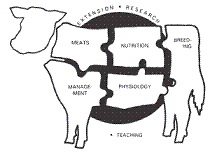Animal Science, Department of

Nebraska Beef Cattle Reports
Date of this Version
2009
Abstract
Two experiments were conducted to analyze the effects of wet distillers grains plus solubles (WDGS) finishing diets on the fatty acid profile of beef. Ribeye slices (m. Longissimus thoracis), tenderloins (m. Psoas major), and top blades (m. Infraspinatus) were analyzed. Calf-fed (Experiment 1) and yearling steers (Experiment 2) (n = 96 each) were allocated into three treatments of 0%, 15% or 30% WDGS (DM basis) for each experiment. For all muscles, polyunsaturated fatty acid (PUFA) levels were higher in beef from animals fed 30% WDGS. Except in tenderloins in Experiment 1, trans fatty acids increased linearly with level of WDGS in the diet. In addition, feeding WDGS increased all trans 18:1 fatty acid isomers except delta 14, which decreased. Feeding WDGS changes the fatty acid profile of beef, which has implications for color stability and shelf life.


Comments
Published in 2009 Nebraska Beef Cattle Report (Lincoln, NE: December, 2008). Copyright © 2008 The Board of Regents of the University of Nebraska.